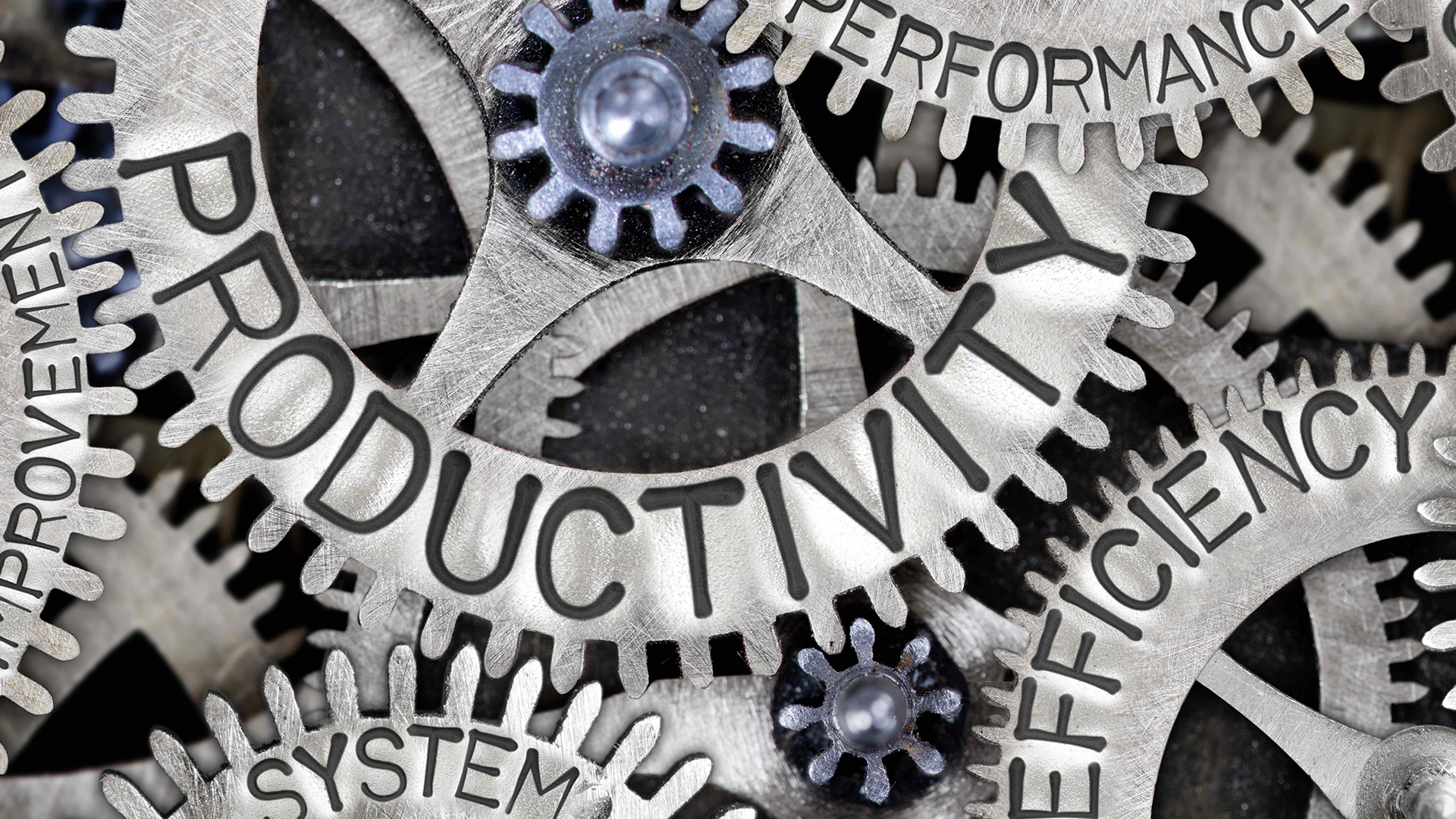
How can we do it all?
We’re already a couple months in to 2020 – how many of us have given up on our New Year resolutions? Most people bail on their ambitious goals for the year by the middle of February. Life happens, right? We probably already have a lot on our plate and trying to squeeze another hour out of the day to go to the gym seems literally impossible. I know I could use a few more hours of daylight each day and maybe even an additional day to the weekend. Then MAYBE I can get it all done.
Productivity and time management are crucial components of success, particularly in a leadership role. It can be overwhelming to think about “all of the things you need to think about” – the company you are responsible for, the projects you’re managing, the team you are leading, and the field that needs to be planted. Then there’s family time – dentist appointments, baseball games, dance lessons, and birthday parties (although I’m pretty good at making time for cake, though). Don’t forget the awesome two-year leadership development program we’re part of! Is work-life balance even possible?
This past seminar, we reflected a lot on resiliency and met a lot of productive people. I found myself thinking a lot about how these people can do it all. How are they managing the process of overcoming challenges and moving forward? How are they managing rapid growth? How are they managing complexities of policy and politics? How are they managing all of this with their personal lives, hobbies, and families?
Over the past couple of years, I’ve tried to find my own work-life balance (and by balance, I really mean try to find time to do it all). There’s no “one system” that you can pay a monthly subscription for that works for everyone. There are, however, an insane number of books discussing productivity and time management techniques. Here’s the kicker though: “reading more” is one of those resolutions that usually gets abandoned early on.
Below are some of the most helpful pieces of information I’ve found in my quest for 24+ hour days and 7+ day weeks. From books and blogs, I’ve developed my own system of productivity. Like most other things, it’s been a lot of trial and error. It’s still not perfect, but it gives me a chance to dream, think, and do. Here are some of the guiding principles that help me get it all done.
- Take advantage of procrastination. Wait, what? Yeah – that’s what I said too. I am a huge procrastinator. It’s natural to procrastinate – the mind is expressing a desire for curiosity and novelty. Instead of fighting it, learn to use it. Acknowledging and validating the urge to procrastinate actually trains your brain to see it as something neutral rather than a threat. This helps with your confidence to get it all done.
- Little habits lead to big impacts. I’m also one to dream up some pretty big goals, which usually require big changes. Big changes all at one time can be overwhelming. Break the changes up into smaller, bite-sized habits. Not only are the smaller changes in routine more palatable, they can also be more sustainable.
- Implement the 4:55 rule. At the end of each day, take a few minutes to think through the next day. If you’re a list maker, this is your chance to prioritize what has to be done and jot it down in your planner on tomorrow’s page.
- Find a method of organizing your projects, to-do lists, etc. This could be a fancy planner, little black notebook, or the calendar app on your phone. I would encourage you to try a couple of different options. I’ve noticed that as my workload changes, my preference to organize my lists and notes changes too. Right now, I’m using an app called Things.
- Give meditation a try. This is a new one for me and I’ve still got a lot to learn. However, making this a small habit everyday helps me to think clearer. It’s a good workout for the brain. I use an app called Headspace to guide me through this process every day.
While there’s no secret recipe for superhero-levels of productivity, there is definitely a major ingredient found in all systems and strategies: the word “no.” It’s just a really hard word to say. Saying “yes” to our coworkers, friends, and family is a lot easier. Because it’s a lot easier to say, we say it a lot more. Then our lists are out of control and whatever system we’ve invested in to help with our productivity or time management becomes overwhelming or inadequate. Saying “no” to one thing is actually saying “yes” to a lot of other things, including the items already on your to-do list, projects you’ve already committed to, and the things you are most passionate about.
Don’t give up on your resolutions just yet. Make the most out of each day.

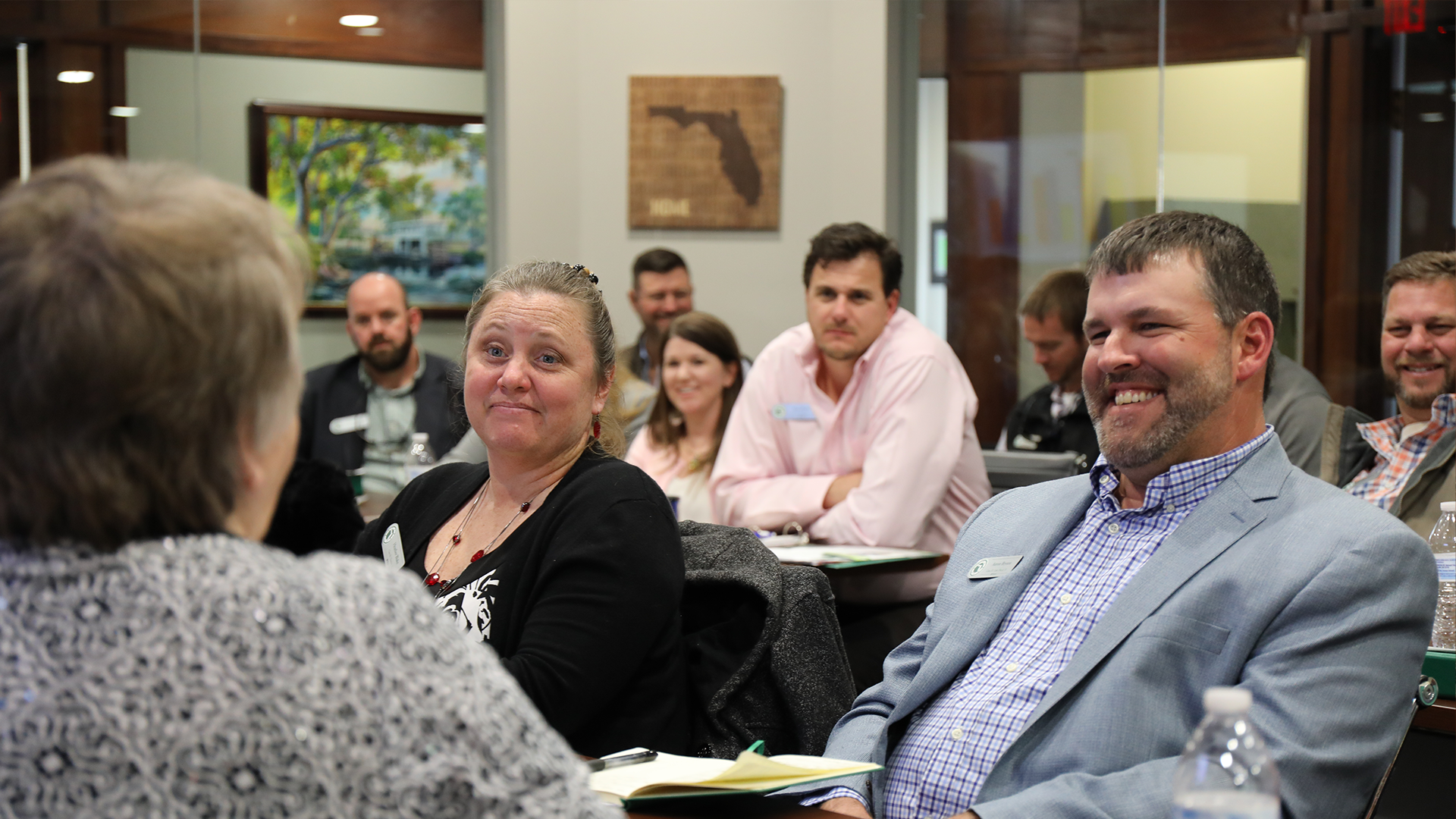
Building Resiliency and Relationships
Seminar II kicked off in beautiful Perry where we learned from fellow Wedgworth Leadership Institute alumni and supporters about the state’s forestry industry. The “Forgotten Coast” suffered tragic losses as a result of the impact of Hurricane Michael. The timber industry in North Florida will see a decline in the production of trees for the next 18 to 50 years in addition to approximately 1.3 billion dollars in damage to the timber. It is costing many landowners more to clean up and replant trees than land is actually worth. The trees that survived the storm are being used for chips, saw timber, plywood, pulp and biomass. To date, the area has received no federal money to assist in the clean up after the storm. The forestry industry in North Florida are resilient and are doing the best they can with the resources available to them.
Tallahassee is a constant buzz while in session. We had the opportunity to hear from a few of the best during our visit. Mike Joyner gave Class XI a lesson in state government and explained that Florida is a very diverse state. He stressed the importance of knowing your priorities and staying laser focused to accomplish those goals whether you are in Tallahassee serving or at home on the local level. If you are not already involved in your commodity-specific organizations (FFVA, Farm Bureau, FNGLA, Turf Grass Assoc, Florida Strawberries, etc.), it is imperative to get your voice heard. It is as simple as waving signs, donating to the cause, or even going door to door advocating.
Marian Johnson is a wealth of valuable information having been involved in every presidential and state campaign since 1964. She noted how Florida has changed and will continue to change with the ever-growing population. It was discussed how the President made one tweet about then Gubernatorial candidate Ron DeSantis and the polls quickly changed, eventually winning the election. The key takeaway from this session was to get to know your House of Representatives and Senators; let them hear from you often, don’t just call when you need them—build relationships.

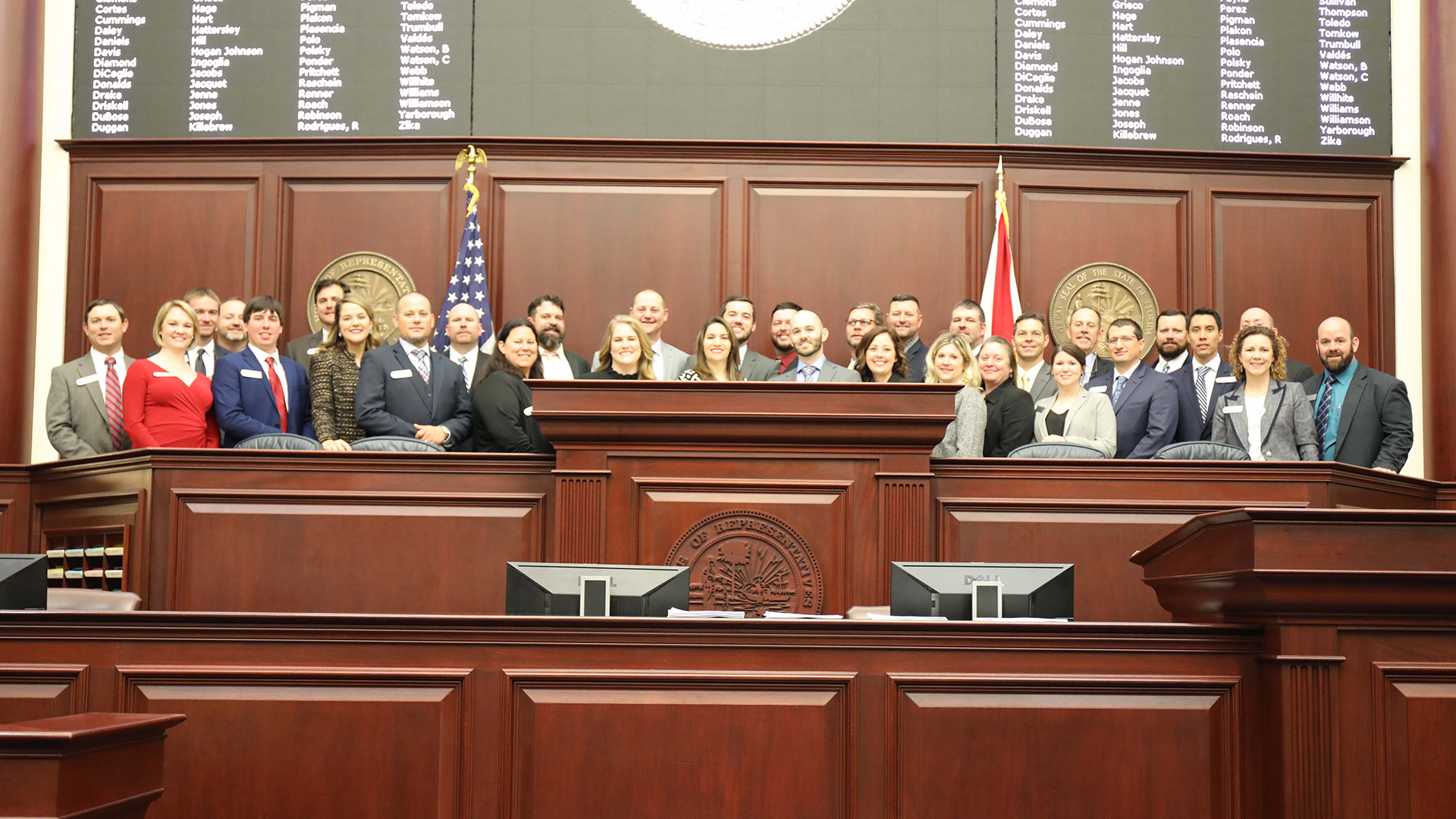
What is Your Leadership Story?
The Florida State Capitol is a busy place, especially during the legislative session. On day 2, Class XI toured the House of Representatives Chamber and heard from a diverse group of leaders. Amongst the diversity, they all share a passion for the people they represent.
Their passion comes from a lifetime of experiences. We heard stories about apprehending fugitives, water policy, cybercrimes, opioid abuse, preserving green spaces, and e-Verify.
So, what is a leader?
- “A leader takes care of the people they are in charge of.” – PJ Joanos
- “A person who leads.” – Merriam-Webster
“Part of being a leader is knowing who you are, what you believe in and why you believe it,” says Senator Albritton. One of the most important parts of your leadership story is your WHY. Also, from Senator Albritton, “Be who you are, not someone different around different crowds.”
What are your fundamental beliefs, or core values, that make you who you are? Maybe you value integrity, honesty, resiliency, commitment, humility or passion. Establish your core values and write them down.
Once you know your WHY and your core values, you’re ready to write your leadership story. In her article titled, “7 Steps to Creating a Leadership Strategy,” Terri Klass recommends following these steps to create your personal leadership story:
- Think about your past.
- Identify critical turning points.
- Write it out.
- Decide how you will communicate it.
- Share it first with a safe person.
- Honor the feedback.
- Promote your story and have fun.
Being a leader is not always easy. How do you stay on top of your game? Mr. Joanos says you learn a lot about someone when they are under stress. As a trainer for the US Marshals Service, he recommends the following strategies for stress management:
- Practice tactical breathing techniques
- Implements a crisis intervention team – a/k/a “hug squad”
- Find something to live for other than your job
- Practice reflection in good and bad situations – you should always discuss what went well and what can be improved upon in the future
If you desire to lead or be a better leader, read Courage to Lead by Charlie Farrell. This short story about life and leadership may lead you to question whether you have the courage to lead.


It All Runs Down (Capitol) Hill
Growing up, what was your greatest responsibility?
- Taking out the trash?
- Washing dishes?
- Feeding the family dog?
Presumably, it is safe to say the responsibilities were minimal. And, if you did not get around to it, someone else most likely would. Majority of folks had a solid safety net – when things got out of hand, our parents and/or adult figures were always there to help clean up the messes.
But, in our modern lives, who cleans up the messes?
With a presidential election approaching, we hear candidates going to great length to discuss the many things they can do for our country – the ways they can make our lives better through governmental power.
After spending time in Tallahassee during Seminar II, we heard very similar messages at the state level. Capitol Hill is filled with platforms, policies (and politics!) that help to shape Florida’s socio-economic and geo-political landscape.
But national and state figures are not the catch-all when it comes to resolution. Seminar II’s community and local commerce visits, which followed our Tallahassee tour, made something abundantly clear – the responsibility still runs down (capitol) hill.
Here are just some of the “messes” we encountered:
- a deflated economy in the town of Quincy
- a town’s tourism industry decimated by oil spill scare and hurricanes in Apalachicola
- an oyster industry essentially razed after overharvest following the BP oil spill
- the unincorporated town of Panacea taking a staggering blow by Hurricane Michael
- domestic and substance-related issues in the Wakulla County court system
Does it sound bleak? It very well could have been.
Had the “messes” been left to greater powers at be or, perhaps, just left alone to sort themselves out, this would be a morbid tale.
Instead, it is a story of empowerment and encouragement.
- In Quincy, we witnessed the economic growth and development brought to town by local nurserymen who joined forces and established Trulieve – a local cannabis operation.
- In the wake of Hurricane Michael, the Apalachicola community prepared their town for their local seafood festival. Defying the odds, it was held mere weeks after the storm and signaled the town was back open for business.
- We learned about the rebirth of an oyster industry that should be all but non-existent if not for local efforts to implement aquaculture and oyster farming practices.
- We heard heartwarming stories from business owners and citizens in Panacea about how, despite being an unincorporated town, the locals joined forces and worked to restore the community following Hurricane Michael.
- Our tours ended with a caring message from the Wakulla County Judge, who made it her personal mission to help the struggling members of her area as they found themselves in her court system.
And these are mere highlights. Each of our visits was riddled with proud community members and leaders, who shared stories and wisdom that reflected the fortitude of the “Forgotten Coast.”
It was both encouraging and inspiring.
And please allow me to clarify – this article, in no way, detracts from the roles of state and national officials. There is a true need for good, strong individuals serving in these capacities and our industry truly needs more representation at these levels. However, not all of us will find ourselves in the political arena.
But, while that may be true, each one of us has a role to play in our counties and communities.
So, spend a few moments reflecting on: your community, your business, your home.
What sort of messes do you see? Who will clean them up?
It might need to be you.

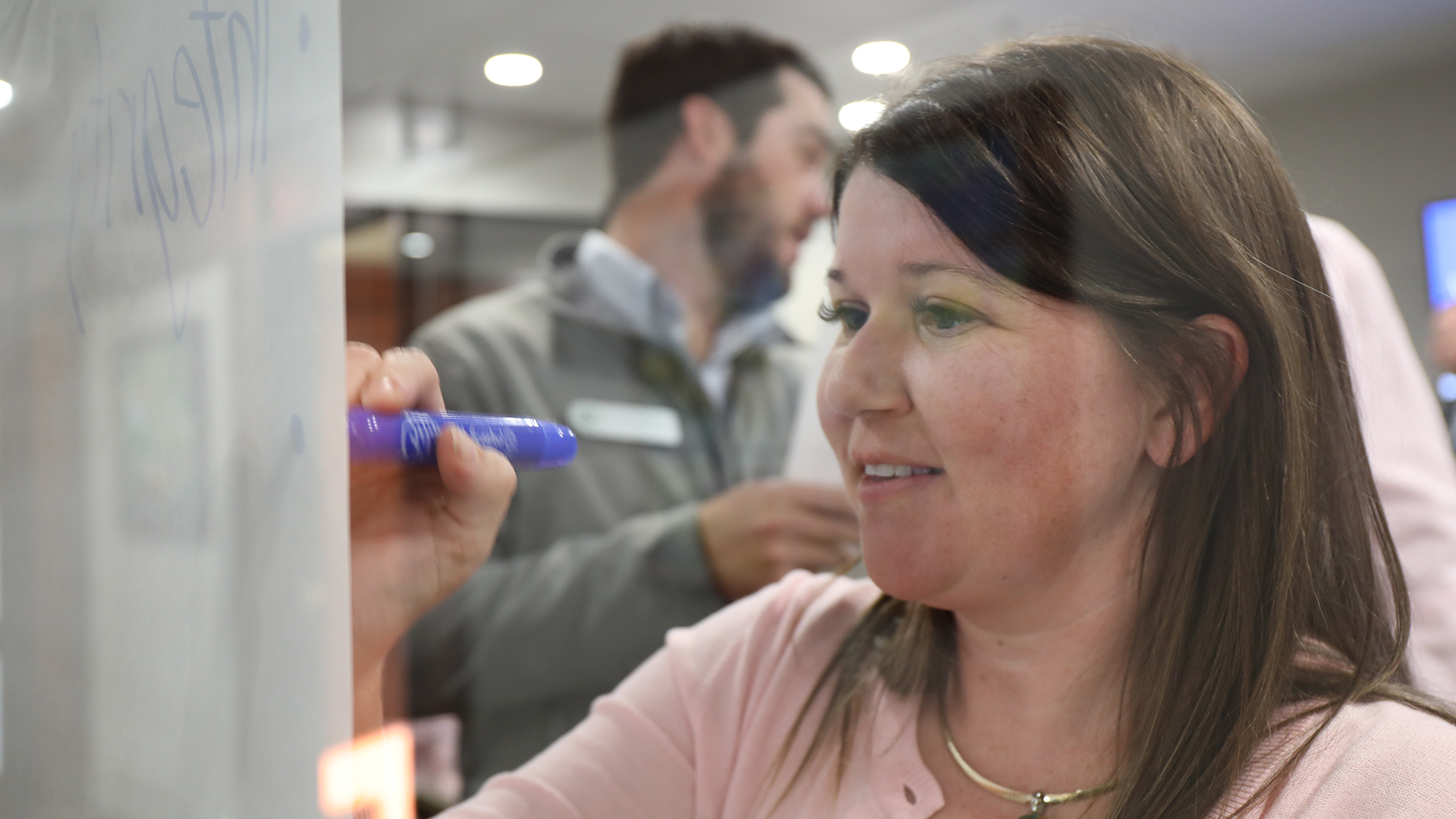
Creating Class Core Values
Creating Class Core Values – Only One Step in the Process
One of the many traditions for each class of the Wedgworth Leadership Institute is the articulation of class core values and the election of a tribunal. Class XI engaged in those activities during Seminar II in January. As all WLI alumni know, the tribunal dates back to Class I and is an important self-governing resource for the class. It’s rare the tribunal is officially used as the entire class participates in self-governing through keeping all class members, including themselves, accountable to the core values and standards of their class and of the program. In most cases, self-governing is done through one-on-one conversations providing encouragement as fellow colleagues walking down this same path of leadership and personal growth.
The class had an outstanding discussion around the idea of core values. It was outstanding not just because of the core values they settled on, but due to the engaging discussion and struggle in which they engaged. It is too easy for individuals and groups, including those with excellent leadership experience, to pass too quickly over a deep conversation about core values – What are they? Why do we need them?
The value of intentional thinking and conversation about core values is it provides a space for members of a group or team to learn more about each person’s standards. Often, we find that two or more individuals are using different words to describe what is discovered to mean much the same. Without time and intentional dialogue, that commonality might get lost and might be seen as a conflict.
The work around group core values is an instance where the process is just as important as the final product. The words that make up the core values communicates not only to this class, but to others the guiding principles of the group. The process to identify these core values hopefully gave each member of the class the opportunity to focus on this and engage in meaningful conversation.
As has been mentioned to the class on numerous occasions, the purpose of WLI is not to make the participants leaders – they already are leaders. The purpose of WLI is to build the leadership capacity for agriculture and natural resources by investing purposefully and intentionally in the personal and professional growth of these individuals. I would argue that one of the foundational aspects of this purposeful and intentional investment is discussion, and hopefully modeling, around core values and accountability.
Growing up listening to Paul Harvey on the radio I always looked forward to his segment. He was a great story teller and as interesting as the story was in the beginning, I knew as soon as I heard those famous word, “now, the rest of the story,” I was about to hear the most important parts of the story and the lesson it was to teach me. The idea of accountability is “the rest of the story,” when it comes to our conversation around core values. It is the linchpin that connects the core values to meaning, to learning, and to personal growth. Without accountability, core values are not worth the ink used to print them or the breath used to say them.
Opening oneself to another person, to say, “I will let you hold me accountable and I will hold you accountable” is not easy. However, time and time again many top-quality leaders share how they had this inner circle of friends, mentors, and/or colleagues to which they made themselves accountable. Do I think someone could be a leader without some form of self-imposed accountability? Yes. However, I would contend strongly that anyone who wants to be that “next-level” leader – that leader who transcends what they are capable of individually – having a network of persons with whom you are painfully honest and they with you, is critical.
I’ve heard people insist they don’t need any form of external, self-imposed accountability. They argue they are a “professional and will remain accountable to themselves.” Although I appreciate the independent and self-sufficient nature of this feeling, my experience tells me that thinking is flawed. This is not to discount the quality of the character of any individual. It has just been shown time and time again in multiple contexts – finances, religion, management, entrepreneurship, etc. – that having a small group of trusted individuals who you know will call you out, helps everyone reach long-term goals for business and personal growth.
This is my challenge to each member of Class XI, to each WLI alumni, and most importantly to myself– lean into accountability. Take the responsibility your classmates have honored you with to hold them accountability with great humility and grace. Carry out that responsibility understanding the magnitude of the trust each class member has place in you. Open yourself up to receive accountability with a gracious attitude and thankfulness that this person believes enough in you to invest their time and energy in your growth.
Yes, vulnerability is hard. The idea of tackling the hard thing to move forward is almost as old as time. Marcus Aureluis said it this way, “the impediment to action advances action. What stands in the way becomes the way.” Ryan Holiday summarizes it this way, “the obstacle is the way.” So, I encourage us all to use the challenge, the obstacle of accountability and vulnerability as the way to personal and professional growth. The opportunity is here, each of us just needs to take it.

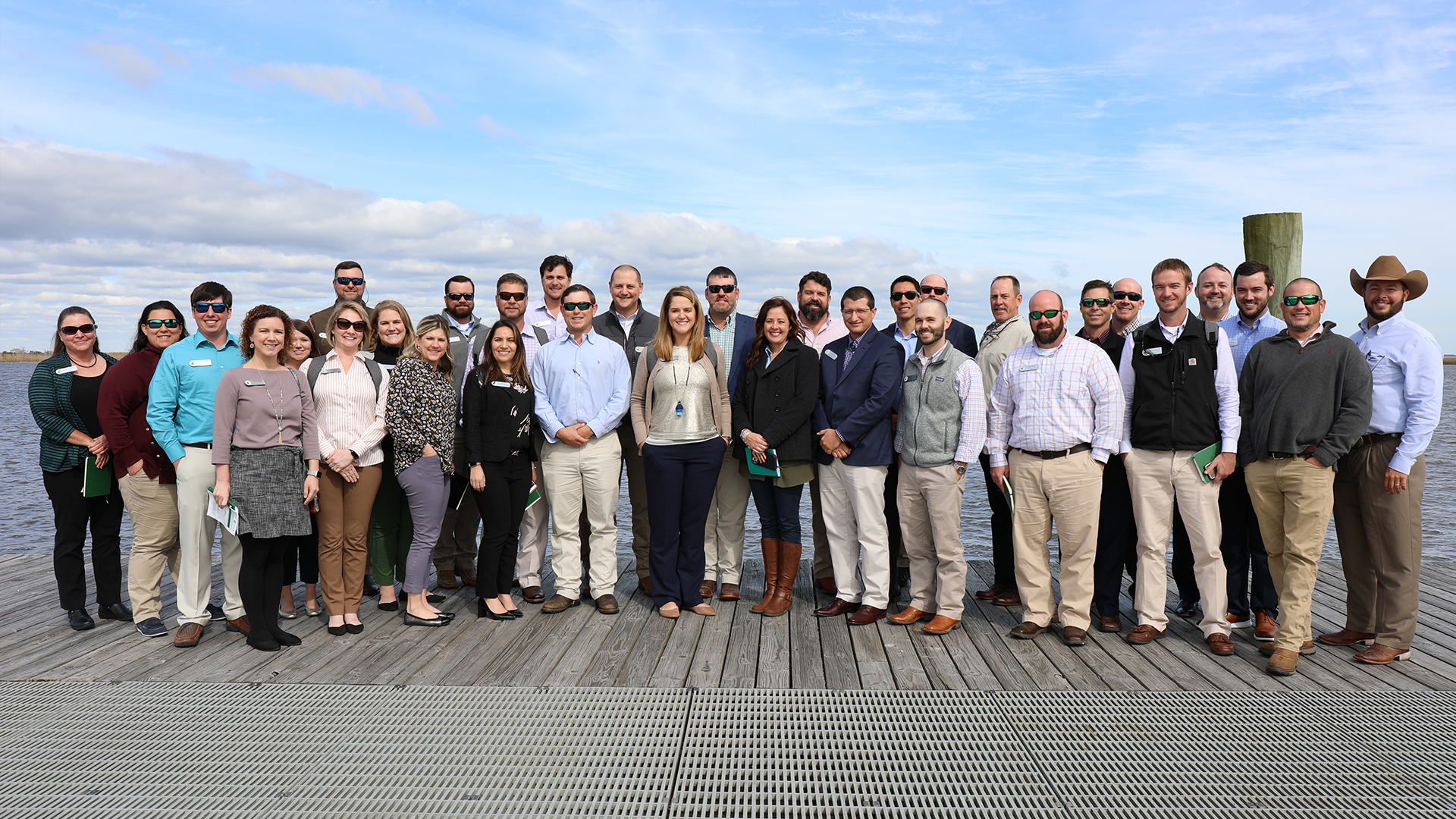
Knowing Your Why
2020 – a new year, a new decade! The perfect season to reflect on where you’ve been and where you’re headed. In the day-to-day rush of checking things off a to-do list and moving full steam ahead, it’s easy to lose sight of why it all matters. Our busyness keeps us focused on “what’s next”, but we must be intentional on remembering “why me, why now?” Simon Sinek does a great job sharing about Finding Your Why.
Why leave your business, your family, your responsibilities for 55 days to travel throughout Florida, the country and the world? Because we believe deeply in the future of Florida agriculture and natural resources. And we believe each of us has a responsibility to secure its future.
As part of Class XI’s responsibility to do their part, they spent time in Tallahassee and the Panhandle exploring the leadership theme of resiliency. Resiliency is a key component of individual leaders and broader industries. In Seminar II, we saw first-hand the hardiness needed to survive in both the policy arena of Tallahassee and in the rural fishing communities of The Forgotten Coast.
In her article, Why Resiliency is Necessary as a Leader , Amy Modglin outlines four key ideas related to resiliency. My favorite line in this article is “It is impossible to demonstrate resilience unless you have gone through difficult times.” If we remain focused on our “why” and understand difficult times build resilience (if we let them), then collectively we are a powerful force for agriculture and natural resources in our state.
Another exciting development for 2020 is WLI is hiring a leadership programs coordinator to assist with program development and support the Alumni Association of the Wedgworth Leadership Institute (AAWLI). We have three strong candidates interviewing in the next two weeks: Jennifer Facenda, Anne Schwartz and Rebecca Lovett. We are offering videoconferencing to the seminar part of their interviews to all current class members and alumni.
Enjoy Seminar II’s Wedgworth Wire!



You must be logged in to post a comment.